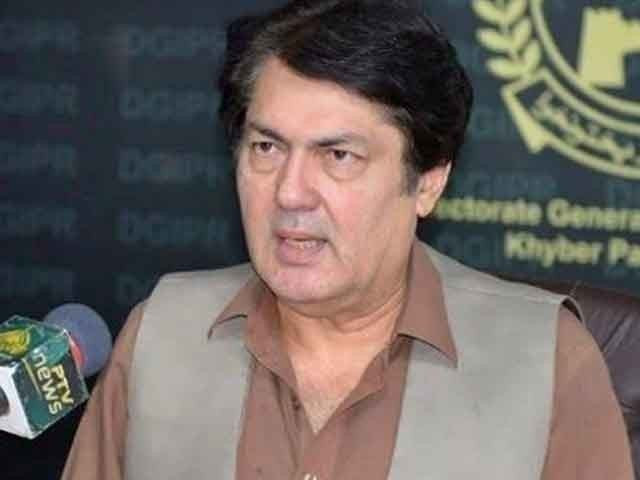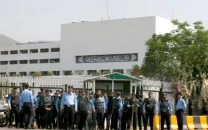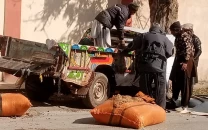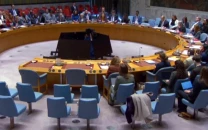The people's mandate cannot be censored: why PTI still stands strong
The people's mandate cannot be censored: why PTI still stands strong

Barrister Dr. Muhammad Ali Saif
In the shadows of an increasingly autocratic political landscape, the people of Pakistan are witnessing a dangerous paradox. A political party which is silenced across traditional media, relentlessly demonised, legally persecuted, and institutionally cornered is somehow still standing and perhaps even stronger than ever in the hearts and minds of Pakistanis. That party is Pakistan Tehreek-e-Insaf (PTI). The more it is targeted, the more it grows. The more it is censored, the louder its voice echoes through every corner of this country and even abroad. And the question that is getting under the skin of the political mafia and haunting its sponsors is why don't people just let go of PTI?
Over the last two years, the scale and intensity of the crackdown against PTI have exceeded even the darkest chapters of our political history. From midnight raids and enforced disappearances to mass disqualifications, party defections under coercion, media blackouts, social media throttling, and dozens of politically engineered court cases, the message has been loud and clear, this party must be erased at all costs. Yet the public response has been equally resolute, not without a fight, not without our vote.
If we examine this unique phenomenon of political resilience of PTI from a sober and analytical lens, it becomes clear that you cannot convince people to start loving the leaders they themselves rejected. In any functional democracy, media plays the role of a mirror. In Pakistan, that mirror has been shattered. In a desperate attempt to marginalise PTI after toppling their elected government, a campaign was initiated to erase PTI and Imran Khan. Mainstream television networks were instructed to erase Imran Khan's name, blur his image, or pretend he does not exist. Anchors were taken off air, columnists silenced, and editors summoned for "guidance." The campaign continues to get viscous and ruthless with every passing day.
Communication experts believe that propaganda is only as effective as the public's willingness to believe in it. People listen to what they want to listen. This has been the first flaw in the state's strategy i.e. you cannot convince a population to hate the very leader they themselves chose, defended, and trusted especially when the alternative is riddled with incompetence and corruption. Following the ouster of Imran Khan from the government, he was replaced with an alliance of almost 12 opposition parties. As inflation spiked, governance collapsed, and the public lost hope in the alliance, the tailored media narrative began to collapse under its own weight. Instead of tarnishing PTI, censorship transformed the party into a symbol of resistance.
Another key variable that was drastically underestimated was the internet. The architects of this repression didn't anticipate the rise of digital resistance. When one screen went dark, thousands of phones lit up. YouTube, TikTok, X (Twitter), and Instagram became the new battlegrounds and the people showed up in large numbers. No big studios, no funding, no instructions, just young men and women, volunteers at home, students, overseas Pakistanis, everyone adding their voice. Each telling the truth. Each refusing to accept silence.
Despite attempts to throttle the internet and arrest online activists, this digital resistance lives on. And through it, PTI stayed connected with the people instantly, honestly, and unfiltered.
Perhaps the most misunderstood aspect of PTI's resilience is that its supporters do not see it merely as a political party. They see it as a moral cause. In their view, this is not a fight for power, it is a fight for dignity, justice, and national independence.
Imran Khan's political narrative, whether you agree with it or not, is the voice of many Pakistanis. The narrative that the Pakistani citizen is not a subject of dynastic families or foreign dictates, but a stakeholder in this nation's future. This idea struck especially deep in the youth, the middle class, and professionals. These segments were historically disengaged from politics but are now fully activated.
This moral dimension i.e the belief that PTI is standing for truth against tyranny, is what makes it unshakable, even in the face of brutal repression. Purge, inquisitions, arrests , bans, and smear campaigns only validate their belief that the system is corrupt, and the struggle is righteous.
Nowhere is this political loyalty more visible than in Khyber Pakhtunkhwa, where PTI has governed with consistency and transparency for over a decade. Khyber Pakhtunkhwa's political relationship with PTI is one of trust. Even in the face of federal neglect, financial strangulation, and security threats, Khyber Pakhtunkhwa under PTI demonstrated better service delivery, cleaner administration, stronger anti-corruption measures, and more responsive leadership. In tribal districts, FM radio network, public outreach programs, and developmental efforts built a bond of trust with communities that had long been ignored by the state.
When the people of Khyber Pakhtunkhwa re-elected PTI with a landslide in the 2024 provincial elections, despite all odds and with zero establishment support, it was a message to the rest of Pakistan, "This is not about propaganda. We have seen results. We have lived under your governance. And we choose PTI again."
Authoritarian strategies often fail not because they are weak, but because they are blind to human psychology. When the state resorts to visible injustice i.e. parading handcuffed leaders, dragging women into courts, slapping terrorism charges for tweets, it may silence some, but it radicalizes others.
The crackdown after 9th May only deepened the divide between ruler and ruled. Instead of crushing PTI, it gave birth to questions that radicalised people's thinking and gave rise to one basic question: Is this a crackdown on criminals or a punishment for challenging the status quo? The answer for most Pakistanis has become crystal clear. Attempts to brand an entire political party as anti-Pakistan has backfired. It has revealed interests in control rather than constitutionality.
Currently, Pakistan stands at a critical juncture. The institutions that were meant to protect democracy are being used to manipulate it. The courts are struggling between conscience and coercion. The media is wounded. The economy is crumbling. And the people's voice is being suffocated.
But in this darkness, the continued popularity of PTI is not just a reality, it is a beacon for hope. It proves that the Pakistanis are neither ignorant nor indifferent. That despite censorship, economic pain, disillusionment, and inquisitions, they are paying attention and they remember Imran Khan's economic performance. They remember the dignity of a leader who refused NROs, who returned IMF money with honor, who spoke for national sovereignty on global platforms. And most importantly, they remember what betrayal looks like and who orchestrated it.
What PTI represents today is more than a party. It is an idea whose time has come and ideas do not fade away with television bans or court cases. You can jail leaders, you can confiscate properties, you can censor speeches but you cannot jail a consciousness that has already awakened.


















COMMENTS
Comments are moderated and generally will be posted if they are on-topic and not abusive.
For more information, please see our Comments FAQ